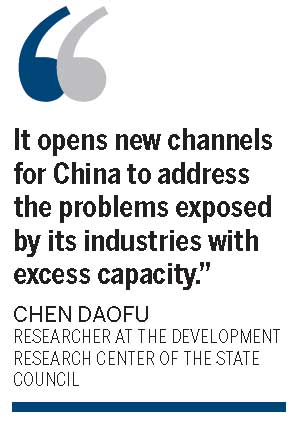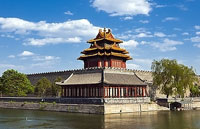New fund finances modern Silk Road
Updated: 2014-11-07 03:52
By Li Xiang(China Daily)
|
||||||||
China has established a fund to finance infrastructure projects along the land-based and maritime Silk Roads, a major step forward under a national strategy to revive the centuries-old trading routes connecting Asia and Europe.
President Xi Jinping said at a financial meeting of the central government on Thursday that the fund will be used to support building of infrastructure including transportation, utilities and telecommunications in countries along the Silk Road economic belt and maritime route.
The creation of the fund was seen by experts as a sign of China's ambition to seek further integration of the global economy and to use its financial strength to promote a well-built and connected Eurasian economic circle.
 |
Xi urged the drafting of a detailed timetable, road map and list of initial projects for the fund as soon as possible.
He emphasized that the projects must reap multilateral benefits and be committed to improving people's livelihoods in the region.
The establishment of the fund followed the creation in September of the Asian Infrastructure Investment Bank, the Beijing-based multilateral financial institution designed to finance infrastructure capabilities in the region.
Xi said that the relationship of that bank and the Silk Road fund with other global and regional financial institutions is complementary rather than mutually exclusive.
Economists said that the Silk Road fund signaled a shift in China's development strategy from focusing on attracting foreign investment to exporting capital and goods to foreign markets.
Chen Daofu, a researcher at the Development Research Center of the State Council, said the fund will help accelerate China's economic transition at home while creating a solid financial foundation to improve regional trade and investment.
"It opens new channels for China to address the problems exposed by its industries with excess capacity. It also brings new markets for its goods and capital," he said.
Construction, equipment manufacturing, utilities, high-speed railway, oil and energy are expected to substantially benefit from the fund.
Xi first raised the new Silk Road plan during visits to Kazakhstan and Indonesia last year. It comprises a land-based economic belt starting from China's ancient capital of Xi'an through Urumqi and stretching to Central Asia, the Middle East and Europe and a maritime route that goes from China's southernmost provinces via the Strait of Malacca and reaches the Horn of Africa before entering the Red Sea and Mediterranean.
"It is a bold idea and gives strong narrative to the relations between China and the inner Asia, the Middle East and the Central European area. These are crucial spaces for China to build political and economic links," said Kerry Brown, executive director of the China Studies Center at the University of Sydney.
It opens new channels for China to address the problems exposed by its industries with excess capacity."
- China to speed up construction of Silk Road
- Silk Road exhibition opens to the public
- Policy banks to lead Silk Road infrastructure fund
- Maritime Silk Road trade to double by 2020
- Silk Road transport network to center on Guangdong
- Fair expected to expand links along maritime Silk Road
- Italy wins with new Silk Road
- Expo to promote Maritime Silk Road cooperation
- Major trade event broadens reach to regions on Maritime Silk Road
- Central Asian nations are ready to roll on the 'new Silk Road'
- 'Silk road' diplomacy for inclusive growth
- Guangdong releases report on new silk road
- Countries share dream of new Silk Road for the 21st century
Most Viewed
Editor's Picks

|

|

|

|

|

|
Today's Top News
Mexico cancels Chinese bullet train deal
China's wealthy look to make 'social impact' on education
Airline exec sees bright side for China and US
China, US must lead on climate: experts
China's coal solution could be in steam
Asian Americans supported Democrats in elections
Is Xiaomi ready for Western markets?
France to assist hunt for corrupt officials
US Weekly

|

|















